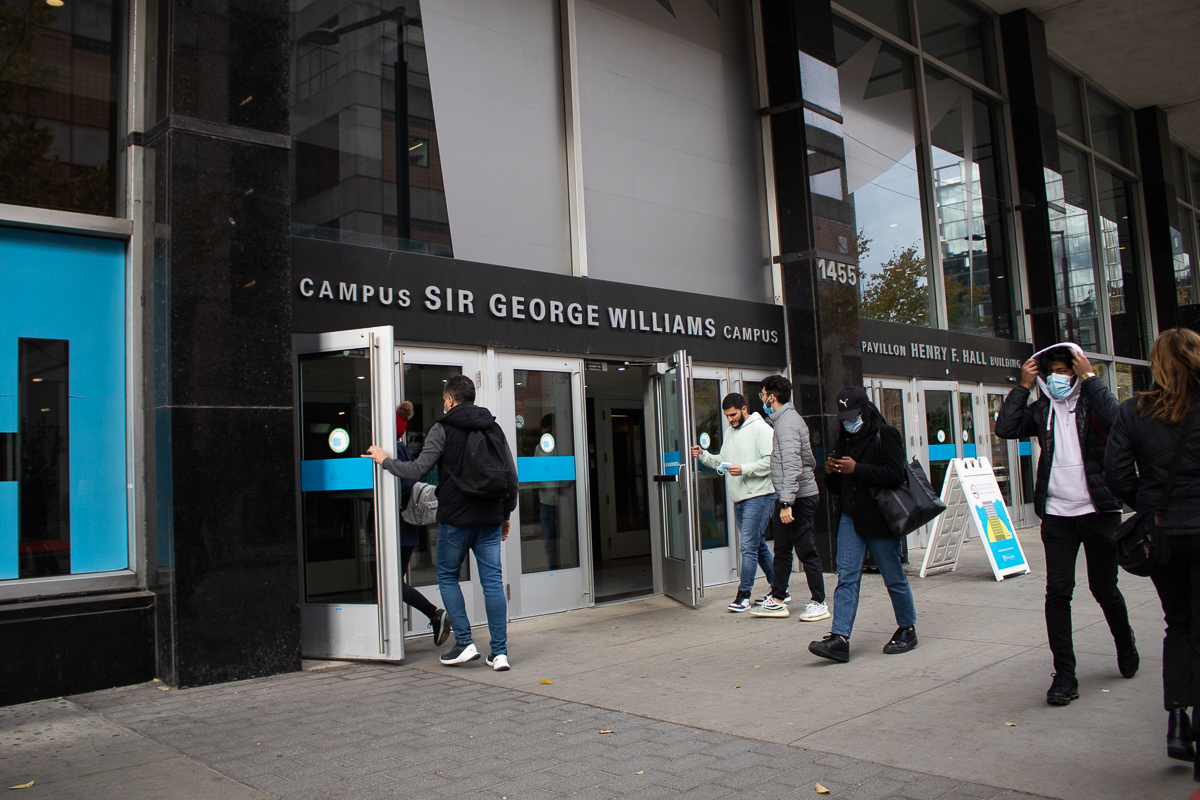The university officially confirmed the return to campus on Feb. 3 in an internal email to Concordia students, one week before the scheduled date
With the official return to campus around the corner, some Concordia community members say the university’s lack of flexibility surrounding in-person courses is disappointing.
The announcement confirming the Feb. 3 date comes close to two weeks after the university initially notified students of the expected return-to-campus schedule.
The Quebec government gave educational institutions — including CEGEPS and universities — the green light return to in-person instruction as of Jan. 17.
“Not everybody has the luxury to come back in person,” said Sethe Nakib, a fourth-year marketing major. “We have other obligations, so being in person might be complicated for some individuals.”
Nakib currently lives in Toronto with her father, for whom she is a primary caretaker. She said she is struggling to arrange for someone to look after her father in her absence, delaying her move to Montreal.
“We’re going to have to make sacrifices that could be easily avoided if we just kept it remote until the end of the semester,” said Nakib.
The Quebec government’s current health and safety measures for educational institutions does not include distancing. However, this has not diluted students’ concerns about returning to classrooms.
Maria Calcara, a first-year child studies student, recalled feeling uncomfortable attending her in-person classes during the fall semester of 2021.
“Everyone was squished with one another, there was no protocol, no distance,” she said.
The thought of returning to physical classrooms on Feb. 3 is nerve wracking for Calcara.
“I’m kind of afraid and [returning to campus] has been causing me a lot of anxiety,” said Calcara. “Everyone should have a choice of whether they go back [in person] or remain online.”
A mixture of reactions
Amid the pushback, the university’s return-to-campus announcement has also ignited sighs of relief from students.
“I’m really happy to get back,” said Nina Severa, a first-year film production student. “I really enjoy being in person and having the social part of school, so I’m really excited about it.”
As a result of COVID-19 health and safety measures, not having access to campus grounds prevented Severa and her classmates from acquiring necessary equipment for various class projects.
Now returning to campus, Severa said she is looking forward to getting her hands on the materials she needs and getting back to working with her peers.
“Just knowing that we are able to go back and we have access to the equipment, […] that’s great for us because we are able to make the movies like we planned to do,” said Severa.
Although Severa feels enthusiastic about returning to campus, she recognizes the need for more flexibility regarding class options beyond those in person.
“If a teacher can offer a hybrid course, I think it should be done so that everyone is accommodated and feels comfortable with the situation.”
Calls for greater flexibility
On Jan. 13, the Concordia Student Union sent an open letter to the university calling on the university to “offer a fully online or at the very least fully hybrid semester […] ensuring that students do not have to choose between dropping out of all their courses and risking their lives.”
The Concordia University Faculty Association (CUFA) echoed the CSU’s concerns in an open letter of their own on Jan. 24.
Addressed to President Graham Carr, CUFA acknowledged that “faculty are divided on the issue of returning to campus.”
The CUFA’s letter pleaded for the postponement of the Feb. 3 return to campus, proposing a gradual return “by bringing smaller classes back first and then gradually adding larger classes as the situation improves.”
In the letter, CUFA requested “Concordia consider allowing faculty to exercise their judgement and academic freedom to decide what they think is best for them and their students, whether this is to continue teaching remotely to return to in person teaching, or to use a hybrid model.”
“An across-the-board decision of a single return date for all is contrary to the flexibility required to adapt to this ever-changing situation,” wrote the CUFA.
Safety concerns
Concordia’s announcement on Jan. 27 noted that “many measures have [been] put in place during the pandemic to protect the health and safety of the Concordia community.” Among these, the university highlighted the mandatory use of masks indoors and maintenance of ventilation and heating systems.
In a statement to The Concordian, Concordia Spokesperson Vannina Maestracci explained that “all preventative measures implemented by Concordia since the beginning of the pandemic have been in line with the directives and guidelines we receive from the government, including public health authorities, and this is still the case for Winter 2022.”
Contact tracing on Concordia’s campuses continues to take place despite challenges of restricted access to PCR tests in the province, according to Maestracci.
Regardless of the measures Concordia has put into place, several students feel that these are not enough.
Tyler Sedborn, a fourth-year accounting student, feels that returning to campus on Feb. 3 is a “quick move” on Concordia’s behalf.
“Why add risk if you don’t need to? You’re putting a lot of people who may or may not have had it already into one building or two,” said Sedborn. “I think that’s kind of a timebomb.”
In their letter, the CSU condemned the university for their “lack of leadership and clarity regarding the health and safety of students, faculty, and staff”, noting that the previous fall semester “saw a flagrant disregard for social distancing and mask mandates.”
Concordia currently requires a vaccine passport to take part in on-campus events and activities “not linked directly to the university’s academic, research and institutional work.”
“All my classes have 130 plus kids, and I don’t feel safe being in a room with anyone not knowing who’s vaccinated or not,” shared Seb Buche, a fourth-year leisure science student. “As if we didn’t have enough on our plates as students already during a pandemic.”
Photograph by Catherine Reynolds
